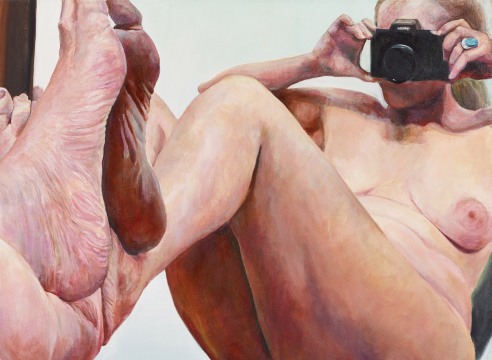
Frieze Masters | London | Spotlight Sector | Booth H9
Alexander Gray Associates presented paintings and works on paper by Joan Semmel (b.1932), selected from the artist’s “Self-Images” series (1974–79) and “Echoing Images” series (1979–81). In both series, Semmel depicts her own nude body, shifting the perspective to a personal point of view. Closely cropped and painted from her own photographs, Semmel participates simultaneously as the observer and the subject of her canvases, a conscious liberation from the traditional male gaze that heralded a feminist approach to painting and representation.
After studying at the Cooper Union, Pratt Institute and the Art Student’s League of New York, Semmel began her career as an abstract painter in the 1960s in Spain and South America. She returned to New York in 1970 seeking out, as she states, “the ‘sexual revolution’ and instead found sexual commercialization that showed female bodies for sale.” The realities of the American “sexual revolution,” prompted her to turn her practice towards figuration with a series of “sex paintings” with the intention of exploring female autonomy and sexuality amidst the cultural landscape of Second-wave Feminism.
In 1974 Semmel began her “Self-Images,” altering the perspective of her compositions towards her own body to capture “the feeling of self, and the experience of oneself.” In works from this period, such as Foreground Hand (1977), she foregoes idealization in unflinching portrayals, and her nude body becomes an abstracted landscape when enlarged to the scale of her canvases. In this body of work, the close viewpoint and use of her camera function as both structuring tools and a means to “destabilize the point of view (who is looking at whom), and to engage the viewer as a participant.” In portraying her own body, Semmel also aimed to subvert the tradition of male artist and female muse from within the painting realm.
In the “Echoing Images” series, Semmel highlights her ongoing stylistic concerns and engagement with both abstraction and figuration. Paintings such as Purple Diagonal (1980) are characterized by the repetition of the main compositional figure in a smaller realist form and palette, and a second in a larger version rendered with expressive brushstrokes in vivid colors. For the artist, “they are almost like internal and external views of the self that combine a perceptual image with the ambition and striving in the emotive ego.”
Working across five decades, Semmel considers the unifying element throughout her body of work “a single perspective: being inside the experience of femaleness and taking possession of it culturally.” Her work firmly situates the female body as a place for autonomy and a vehicle to challenge the objectification and fetishization of female sexuality and the invisibility of the female aging body. Through content that Semmel describes as having “been consistently fired by my desire for the work to impact and to help change the way women are perceived and how we perceive ourselves,” and formal explorations, her work has greatly contributed to the history of painting and feminist debates by confronting and subverting the dominant cultural narratives in Art History and Western society.
About Frieze Masters
Frieze Masters is a fair which presents a contemporary perspective on historical art. The fair features leading galleries showcasing art made before the year 2000, ranging from the ancient era and old masters to the late 20th century. Frieze Masters' Spotlight is a section of the fair dedicated to 20th century art made all over the world, from Latin America to the Middle East.













